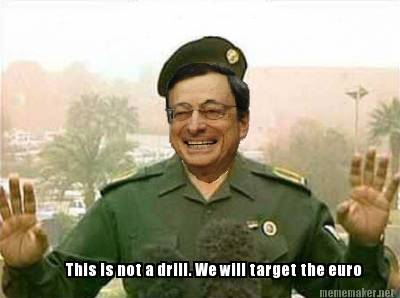So, Mr Draghi has declared war on the euro officially now. His previous ramblings have held back from saying that they will target the exchange rate with policy but the remarks over the weekend couldn’t be clearer.
“a further strengthening of the exchange rate … would require further monetary policy stimulus.”
It was only a couple of ECB meetings ago where the level of the euro was brushed aside and that the ECB only gave it a cursory glance now and again. Was he lying then or is he lying now?
It seems very strange that every Tom, Dick and Herman is talking about the exchange rate now. Where was the talk over the last 7/8 years? Where was the talk before the crisis started and the euro was at 1.50+. Where was the talk when euro zone members were queueing up at the bail out soup kitchen and we were into the 1.40’s. Yes, we’ve been down to the low 1.20’s over the crisis on fears that the European project wouldn’t survive but those times were fleeting.
Why, when most in Europe see an end to the crisis and a pick up in the economy, are we now hearing about QE and “unconventional tools”. I thought they were designed to stop the rot and underpin an economy not to target inflation and the exchange rate? There’s also two major economies (UK & US) that have undertaken QE and have not seen inflationary pressure coming in as feared, so why will it work for Europe?
We know the pros and cons for a strong currency but is Draghi and the ECB going to embark on further loosening to tackle the currency when even they admit a recovery is underway? It’s possible that they want to aid any recovery with a little “kicker” but will that mean it’s a small localised dose of QE coming not a US style “kitchen sink” affair? How will the market react to that? The other side of the question is why didn’t they embark on QE when the economy was really in the toilet?
I don’t believe for one minute that they are going to change policy to target the exchange rate. For one it’s pointless as the market usually throws such moves back in a central banks face, and two, if deflation isn’t a real problem (as we keep being told) and if the recovery is gaining traction (as we keep being told), they’ll be fighting a loosing battle on FX. If inflation moves back towards 1.2-1.5% over the next 2-3 months the market is going to take policy moves off the table. If the economy picks up in a meaningful way the market is going to turn its attention to rate rises not cuts. Where’s that going to leave policy on the exchange rate?
If you don’t believe me I give you what’s happened in the UK. Several times last year when commenting on the UK I said it should be used as a blueprint for what happens elsewhere. The pound has risen over 200o pips since the recovery took hold last year and has outpaced the euro by around 1000 pips in the same period. What’s going to happen to the euro if it sees the same level of recovery the UK has?
While Mario and the ECB have managed to verbally restore Europe to a sounder footing I think this is one battle they are going to lose both verbally and physically. Yes there are still plenty of risks to the recovery, to inflation and to Europe in general but I’m inclined to think we’ve seen the bottom of it. While those risks are still big enough not to ignore, and are still very much a tightrope walk, I think the bigger move is towards a strengthening of the economy and a rise in inflation, and that’s something the market will not ignore whatever the ECB policy is. We will get QE if the economy shows signs of going backwards but we’re a long way from that happening according to the data.
Right now things are still finely balanced. Prices are falling and the recovery isn’t as good as some make out. That picture can turn on a dime and if it does you won’t want to be short euros.




